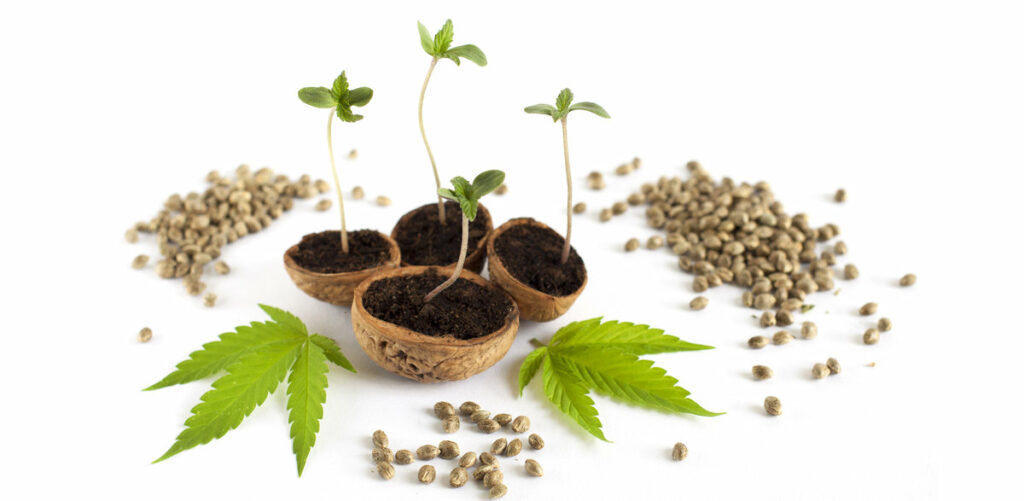Introduction
When it comes to growing cannabis, the type of seeds you choose can significantly impact the quality of your plants and the final product. One key distinction in the world of cannabis seeds is between organic and conventional options. Understanding the differences between these two types of seeds can help you make an informed choice based on your cultivation goals and preferences.
What Are Organic Cannabis Seeds?
Organic cannabis seeds are produced from plants grown without synthetic pesticides, herbicides, or fertilizers. The organic farming process focuses on maintaining soil health, promoting biodiversity, and using natural methods to control pests and diseases.

Key Features of Organic Cannabis Seeds:
- Natural Farming Practices: Organic seeds come from plants grown using sustainable practices that prioritize soil health and environmental stewardship. These methods often include composting, crop rotation, and the use of organic pest control methods. By focusing on these practices, organic cultivation enhances soil fertility and encourages a balanced ecosystem.
- Non-GMO: Organic seeds are not genetically modified. They are bred using traditional methods to ensure genetic purity and maintain the natural traits of the cannabis plant. This traditional approach preserves the inherent qualities of the plant and supports biodiversity.
- Chemical-Free: Organic cultivation avoids the use of synthetic chemicals. This means that the seeds and the resulting plants are free from residues that could potentially affect health or flavor. The absence of harmful chemicals also ensures a cleaner, more natural end product.
- Environmental Impact: Organic farming practices aim to reduce the carbon footprint and promote a more sustainable approach to agriculture, which can benefit the overall ecosystem.
What Are Conventional Cannabis Seeds?
Conventional cannabis seeds are produced from plants grown using standard agricultural practices that may include the use of synthetic fertilizers, pesticides, and herbicides. These seeds are typically bred for high yields and consistent growth patterns.
Key Features of Conventional Cannabis Seeds:
- Use of Chemicals: Conventional farming often involves the application of synthetic chemicals to enhance growth, control pests, and increase yields. These chemicals can leave residues on seeds and plants. Conventional farming often relies on synthetic pesticides, herbicides, and fertilizers to boost yields and protect crops. These chemicals can accumulate in the soil and potentially in the seeds themselves.
- Genetic Modification: While not all conventional seeds are genetically modified, some may come from plants that have been altered for specific traits, such as increased resistance to pests or faster growth rates. Although not all conventional cannabis seeds are genetically modified, some might originate from plants that have undergone genetic alteration to enhance specific traits. This can introduce unforeseen consequences into the plant’s genetic makeup.
- High Yields: Conventional methods are often designed to maximize yields and efficiency. This can lead to more uniform plants and potentially higher production levels. Although not all conventional cannabis seeds are genetically modified, some might originate from plants that have undergone genetic alteration to enhance specific traits. This can introduce unforeseen consequences into the plant’s genetic makeup.
- Less Emphasis on Sustainability: Conventional practices may focus more on immediate results and less on long-term environmental impact, which can lead to soil degradation and reduced biodiversity.
Comparing Organic and Conventional Cannabis Seeds
1. Quality of the Final Product: Many growers believe that organic seeds lead to a higher quality final product. Organic cannabis is often noted for its rich flavors, aromas, and smoothness, which can be attributed to the natural growing practices and the absence of synthetic chemicals.
2. Health Considerations: Organic cannabis is typically free from synthetic chemical residues, making it a preferred choice for those who prioritize health and wellness. Conventional cannabis, on the other hand, may contain trace amounts of pesticides or fertilizers.
3. Environmental Impact: Organic cultivation is generally more environmentally friendly, focusing on sustainability and reducing the carbon footprint. Conventional methods may have a greater environmental impact due to the use of synthetic chemicals and intensive farming practices.
4. Cost and Accessibility: Organic seeds can be more expensive due to the costs associated with organic farming practices. Conventional seeds may be more readily available and affordable, but they may come with trade-offs in terms of quality and environmental impact.
5. Growth and Yields: Conventional methods often lead to faster growth and higher yields, which can be advantageous for commercial growers. Organic cultivation may result in slower growth and lower yields but offers a more natural and sustainable approach.
Also Read: Organic vs. Synthetic Fertilizers: What’s Best for Cannabis Seedlings?
Conclusion
Choosing between organic and conventional cannabis seeds depends on your priorities and cultivation goals. Organic seeds offer a more natural and sustainable option, often resulting in a higher quality product with fewer chemical residues. Conventional seeds may provide higher yields and faster growth but come with potential trade-offs in terms of environmental impact and chemical use.
Ultimately, the decision comes down to what matters most to you—whether it’s the quality of the final product, environmental sustainability, or the efficiency of the growing process. By understanding the differences between organic and conventional cannabis seeds, you can make a more informed choice that aligns with your values and goals.
